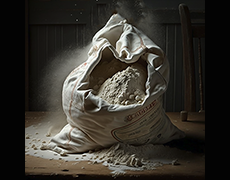
Aleuromancy is an ancient form of divination that has its roots in ancient Greece. The word “aleuromancy” comes from the Greek word “aleuron,” which means “flour,” and “manteia,” which means “divination.”
In this practice, fortunes or messages were written on slips of paper and then rolled up in balls of flour dough. These balls were then placed in a bowl, stirred to mix them up, and people who wanted to know their fortune would choose one of the balls.

It was believed that the god Apollo presided over this form of divination.
The practice of aleuromancy developed in other cultures, including ancient Rome and China.
In China, this practice is known as “bun divination,” and it is still practiced today. In this practice, messages or fortunes are written on slips of paper and then placed inside steamed buns. These buns are then mixed up and served, and the person who receives a bun with a particular message is believed to have received a divinatory message.
In Western culture, aleuromancy has been replaced by other forms of divination, such as tarot cards, astrology, and palm reading.

However, aleuromancy continues to be practiced in some form today, particularly in the form of fortune cookies, which are commonly served in Chinese restaurants. These cookies contain a slip of paper with a message or fortune, which is believed to offer guidance or insight into one’s future.
The messages in aleuromancy can vary widely, ranging from simple statements of fact to more complex predictions or advice. Some messages may be specific to a particular individual, while others may be more general in nature. In any case, the practice of aleuromancy has always been focused on providing insight and guidance to those seeking it.

